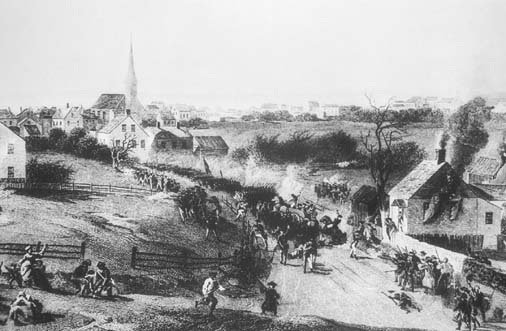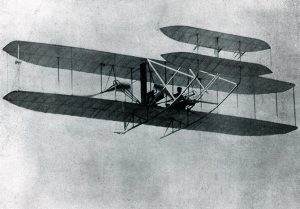“BANG!” The first shots were fired on the village green at Lexington, Massachusetts on April 18, 1775. The British initiated the battle at Lexington, followed by Concord, Massachusetts. There were several events that led up to the Battles of Lexington and Concord, including the Stamp Act of 1765, the Boston Massacre of 1770, and the Boston Tea Party of 1773. These events illustrated the struggles the thirteen colonies had to undergo because of the British Crown and its numerous, restrictive policies. For months leading up to the war, townsmen and farmers of Massachusetts had been training and gathering arms and ammunition in order to be prepared to fight at a minute’s notice; these men were known as minutemen. Continental Congress had approved their preparations and these minutemen sat in wait for the British to make their first move.1

General Thomas Gage, commander of the British Garrison in Boston, had been aware of military preparations in the countryside. Given orders from England to arrest rebel leaders Sam Adams and John Hancock, Gage finally decided to act after learning about the large supply of ammunition in Concord. A detachment of roughly one thousand soldiers headed out from Boston to surprise the colonists and seize the supplies. General Gage’s moves were being closely monitored by the Patriots.2 General Joseph Warren, a spokesman for the anti-British rebels and a member of the committee, began to pay close attention to the British increasingly suspicious movement toward both Lexington and Concord. His attention to detail proved to be a main factor, serving to prepare the minutemen for battle. That night, Paul Revere and William Dawes were assigned to watch the movements of the British and to notify the people in the case of an advance.3 As Revere and Dawes caught sight of the British advancement, they rushed to notify the minutemen. Revere’s famous midnight ride has been immortalized ever since in Henry Wadsworth Longfellow’s poem, “Paul Revere’s Ride.”4

Now, armed with the knowledge that British troops were advancing on Lexington, Captain John Parker and his single company of minutemen stood on the Lexington village green awaiting the British arrival.5 The British arrived and shots rang out. Eight minutemen died and nine were wounded. The Patriots’ attack proved to be fatal to their own militia, but it helped slow down the British arrival to Concord. At this time word reached Concord and the minutemen were able to hide away some of their supplies and prepare for battle. As the British advanced through the ranks of British Major John Pitcairn, the Patriots stood on the Old North Bridge awaiting them. When the two sides came face to face, the first shot—known as the “shot heard round the world”—was fired. This loud statement of retaliation would be pivotal to the Americans, who were in anguish over British rule. The British retreated from Concord where they would encounter multiple surprise attacks from the Patriots.6 Neither side could have predicted that this would be the first battles of what would become the American War for Independence. The British army’s underestimation of the Americans’ resistance proved to be fatal, as they lost many soldiers and ignited something greater. The Patriots would not stop until they had independence; the American Revolution had officially begun.
- Alan Brinkley, American History: Connecting with the Past Volume 2, 15 edition. (Columbia University: McGraw-Hill Education, 2015): 124-126. ↵
- Ormby Gilbert Seeley, Views and Description History of Lexington and Concord, Massachusetts (Lexington, Mass, O.G Seeley, 1901), 12-15. ↵
- American National Biography, 2010, s.v. “Joseph Warren,” by Ethan S. Rafuse. ↵
- Henry Wadsworth Longfellow, Paul Revere’s Ride and Other Poems (New York: Houghton, Mifflin and Company, 1894): 1-5. ↵
- Salem Press Encyclopedia, October 2015, s.v. “Battle of Lexington and Concord,” by Don R. Higginbotham and Richard Adler. ↵
- Funk & Wagnalls New World Encyclopedia, October 2016, s.v. “Battle of Concord.” ↵



25 comments
Vanessa Preciado
Interesting article. I am reading about these events right now in history, so its nice to get some more knowledge. This brief article pretty much show where Paul Revere makes his appearance in the 13 colonies. I wish there was more resources about this time, so that we can get a little more of an idea of what these gentlemen lived and felt like. I wonder what they would think right now if they knew there were history books and articles on the STMU scholars page. Nice work and great choice of pictures, it helps with picturing the scenario better.
Andrew Petri
This article was very interesting and though it was short did a great job at getting the information to the reader and not dragging on. I remember learning about the shot heard around the world when I was younger and in school. This article was a great refresher and I like how the mentioned the minutemen because I thought they were a very interesting part of our history.
Lamont Traylor
When I first heard the title of this article, I already knew that it was about the revolution were the first man that shot between the guards of the British and the colonists sparking the war. This is the time of Paul Revere and the Boston tea party incident. I think this was a very pivotal turning point in Americas history.
William Rittenhouse
This was a very short and well written article. The events prior to the war actually begining was what actually sparked the war. The Revolutionary war was one that changed the fate of our country for the better. I’m sure it would be pretty strange still being under British control, but thank God we aren’t. I think it would be much different. Now because of the minuteman and these events we are able to be free.
Mia Stahl
In my middle school history class I remember vividly learning about the “shot heard around the world” and how extremely vital this pivotal point in history was. I also vividly remember learning about the Minutemen and the role they played in the history of our nation. This article was a nice refresher of that and reminded me of how incredible American’s pursuit of freedom was from the British empire.
Robert Rodriguez
I still remember learning about this in middle school and “the shot heard around the world” which sparked the fight for Americas Independence from Britain. This article was very well written and informative! I really enjoyed the exaggeration of the minutemen’s role because they really did play one of the most important part in these wars. Great job!
Brandon Martinez
This article did a good job in describing the events leading up to the start of the Revolutionary War and describes the event itself. I disnt realize what all happened at this battle and just how important it was. This single event made the colonies fight against their leader. I enjoyed reading about this event and the article does a good job of grabbing the readers attention, so overall this article is very good.
Fumei P.
I loved the recount of this story. There was so much patriotism, and it served as a simple refresher to that moment in history. It highlighted the bravery of simple townsmen and farmers who had answered a higher calling to defend their beliefs. Also it underlined the importance of Paul Reveres warning and the courage of the minutemen to give their lives, and their fierce defiance which was enough to make the British retreat.
Clarissa Bustamante
Great article overall! I love how you decided to write about a very important time in History. I don’t really know a whole lot about the American Revolution but I do know that this event was specifically an impact to history. Such a great job describing in detail the way the battle ended up and in total the whole event. Also how you mentioned the “Minute-Men” and how they were a crucial part at the time. I really liked how you incorporated both the British and the American sides of the battle.
Troy Leonard
I have to say, you did a great job with grabbing the audience and captivating their attention with the beginning of the article. I lose interest fast in reading and in this case you have all of my attention. you did a great job at explaining what was going on and had some great information in there too. o didn’t know that general lee had staged that attack until reading this article.